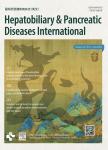Diverse and precision therapies open new horizons for patients with advanced pancreatic ductal adenocarcinoma
Diverse and precision therapies open new horizons for patients with advanced pancreatic ductal adenocarcinoma作者机构:Cancer Centerthe First Hospital of Jilin UniversityChangchun 130021China
出 版 物:《Hepatobiliary & Pancreatic Diseases International》 (国际肝胆胰疾病杂志(英文版))
年 卷 期:2022年第21卷第1期
页 面:10-24页
核心收录:
学科分类:1002[医学-临床医学] 100214[医学-肿瘤学] 10[医学]
基 金:supported by grants from the National Key R&D Program of China(2016YFC1303800) Jilin Provincial Key Labora-tory of Biological Therapy(20170622011JC) Jilin Provincial Science and Technology Department(20190303146SF) Jilin Province Finance Department(2018SCZWSZX-010)
主 题:Tumor Pancreatic ductal adenocarcinoma Targeted therapy Immunotherapy Epigenetics Tumor microenvironment
摘 要:Pancreatic ductal adenocarcinoma(PDAC)is a common cause of cancer-related death,and most patients are with advanced disease when *** present,despite a variety of treatments have been devel-oped for PDAC,few effective treatment options are available;on the other hand,PDAC shows significant resistance to chemoradiotherapy,targeted therapy,and immunotherapy due to its heterogeneous genetic profile,molecular signaling pathways,and complex tumor immune ***,over the past decades,there have been many new advances in the key theory and understanding of the in-trinsic mechanisms and complexity of molecular biology and molecular immunology in pancreatic can-cer,based on which more and more diverse new means and reasonable combination strategies for PDAC treatment have been developed and preliminary breakthroughs have been *** the continuous ex-ploration,from surgical local treatment to comprehensive medical management,the research-diagnosis-management system of pancreatic cancer is *** review focused on the variety of treatments for advanced PDAC,including traditional chemotherapy,targeted therapy,immunotherapy,microenviron-ment matrix regulation as well as the treatment targeting epigenetics,metabolism and cancer stem *** pointed out the current research bottlenecks and future exploration directions.



